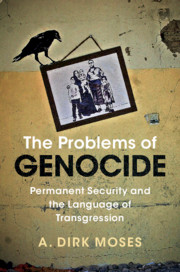Book contents
- The Problems of Genocide
- Human Rights in History
- The Problems of Genocide
- Copyright page
- Contents
- Preface
- Introduction
- Part I The Language of Transgression
- Part II Permanent Security
- Part III The Language of Transgression, Permanent Security, and Holocaust Memory
- 10 Lemkin, Arendt, Vietnam, and Liberal Permanent Security
- 11 Genocide Studies and the Repression of the Political
- 12 Holocaust Memory, Exemplary Victims, and Permanent Security Today
- Index
11 - Genocide Studies and the Repression of the Political
from Part III - The Language of Transgression, Permanent Security, and Holocaust Memory
Published online by Cambridge University Press: 07 January 2021
- The Problems of Genocide
- Human Rights in History
- The Problems of Genocide
- Copyright page
- Contents
- Preface
- Introduction
- Part I The Language of Transgression
- Part II Permanent Security
- Part III The Language of Transgression, Permanent Security, and Holocaust Memory
- 10 Lemkin, Arendt, Vietnam, and Liberal Permanent Security
- 11 Genocide Studies and the Repression of the Political
- 12 Holocaust Memory, Exemplary Victims, and Permanent Security Today
- Index
Summary
The North American and Israeli scholars who founded Genocide Studies in the 1980s and 1990s also insisted on genocide’s Holocaust archetype. These scholars successfully resisted the “conceptual stretching” of genocide to include political criteria in its definition. Domestically, they advocated an apolitical “toleration” pedagogy as genocide’s antidote. The US victory in the Cold War in the early 1990s sidelined the lively critique of the US national security state and gave rise to a new age of interventions. Vietnam-induced doubts were left behind as “the indispensable nation” became the world’s hyper-power. Although the founders of Comparative Genocide Studies were liberals who opposed the Vietnam War, they eagerly adopted the role of academic handmaiden to US global aspirations: the field anointed the US as the benign force to police the non-West in the form of humanitarian interventions to prevent genocide, other “atrocity crimes,” and to wage “war on terror.”
Keywords
- Type
- Chapter
- Information
- The Problems of GenocidePermanent Security and the Language of Transgression, pp. 441 - 476Publisher: Cambridge University PressPrint publication year: 2021

